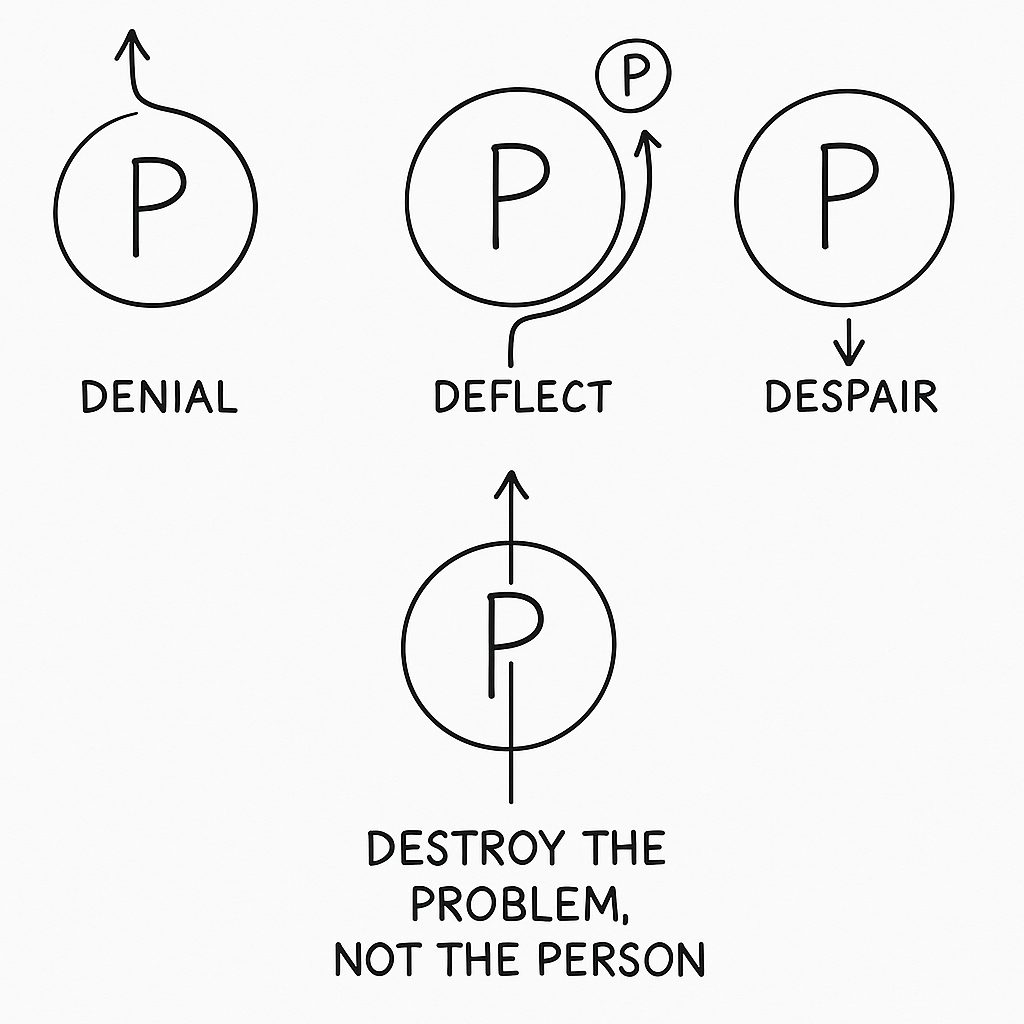Every one of us faces problems, whether in relationships, work, or our inner lives. Conflict is inevitable, but how we respond to those problems determines whether we grow or collapse under their weight. Jay Adams, the pioneer of Biblical Counseling, emphasized that Christians must confront problems biblically rather than avoid them. He often said that our goal is to destroy the problem, not the person.
That single truth reshapes the way we approach conflict, sin, and discouragement. When we handle problems God’s way, we move toward redemption and restoration, not resentment or ruin.
Unfortunately, most of us default to one of three unhelpful patterns: denial, deflection, or despair. Each one offers temporary comfort but ultimately prevents lasting change.
1. Problems Denied: The Path of Avoidance
The first way we mishandle problems is denial, pretending the issue does not exist. Like the first diagram, we push the problem out of view and convince ourselves everything is fine.
But denial never brings healing. It simply hides pain beneath the surface, where it grows into bitterness, resentment, or sin.
Proverbs 28:13 (ESV) warns,
“Whoever conceals his transgressions will not prosper, but he who confesses and forsakes them will obtain mercy.”
When we deny a problem, whether personal sin or relational conflict, we cut ourselves off from the mercy God freely offers. We may protect our pride, but we lose our peace.
The Biblical Way:
Confession and honesty. God invites us to walk in the light (1 John 1:7–9). Admitting the truth brings us into the place where His grace can do its work.
Denial says, “There’s no problem.”
Truth says, “There’s a problem, but God’s grace is greater.”
2. Problems Deflected: The Path of Blame
The second common reaction is deflection, moving the problem away from ourselves and toward someone else.
Like the second diagram, we keep the problem nearby but shift the focus outward:
- “It’s not my fault.”
- “If they hadn’t done that, I wouldn’t have responded this way.”
- “I’m only reacting to what they did.”
Deflection may protect our ego, but it prevents repentance. Jay Adams reminded us that when we place responsibility outside ourselves, we also remove our ability to change.
Matthew 7:3–5 (ESV) challenges us:
“Why do you see the speck that is in your brother’s eye, but do not notice the log that is in your own eye?… first take the log out of your own eye, and then you will see clearly to take the speck out of your brother’s eye.”
The Biblical Way:
Humility and responsibility. The first step toward peace is examining our own hearts. We cannot control another person’s actions, but we can take ownership of our reactions.
Deflection says, “The problem is out there.”
Humility says, “I must examine my own heart first.”
3. Problems Despaired: The Path of Discouragement
Sometimes we don’t deny or deflect, we despair.
In the third diagram, the arrow loops inward, symbolizing a person who internalizes the problem so deeply that they lose hope. They begin to believe the lie: “I am the problem.”
Despair robs us of faith and replaces it with shame. We stop seeing God’s ability to redeem and start believing our situation, or our heart, is beyond repair.
The Apostle Paul described this inner struggle in Romans 7:24:
“Wretched man that I am! Who will deliver me from this body of death?”
But Paul did not stay in despair. He immediately turned his eyes to the Gospel:
“Thanks be to God through Jesus Christ our Lord!” (Romans 7:25)
The Biblical Way:
Faith and renewal. Despair collapses under the weight of sin, but faith looks up to Christ for strength. Our problems are real, but our identity is found in the One who redeems us.
2 Corinthians 5:17 (ESV) says,
“If anyone is in Christ, he is a new creation. The old has passed away; behold, the new has come.”
Despair says, “I’m beyond help.”
Faith says, “Christ is my hope.”
4. Problems Destroyed: The Path of Redemption
The final and biblical way to address problems is to destroy the problem, not the person.
In the fourth diagram, the arrow pierces through the problem, symbolizing truth, grace, and redemption working together. The person doesn’t escape, deflect, or collapse; they confront the issue in the power of God’s Spirit.
This is the way of love and truth.
Ephesians 4:15 (ESV) calls us to “speak the truth in love.” Confrontation, when done biblically, is not cruel; it’s compassionate. Jay Adams taught that genuine love corrects because it desires restoration.
When we confront problems biblically, we imitate God Himself. He did not deny our sin, deflect our guilt, or despair over our failure. Instead, He destroyed sin through the cross while redeeming sinners through Christ.
Romans 8:3–4 (ESV) says,
“By sending his own Son in the likeness of sinful flesh and for sin, he condemned sin in the flesh, in order that the righteous requirement of the law might be fulfilled in us.”
God destroyed the problem (sin) without destroying the person (the sinner). That is the Gospel, and that is our model.
Applying This to Everyday Life
When you face relational tension, emotional pain, or sin:
- Reject Denial – Bring your struggle into the light before God.
- Reject Deflection – Take responsibility where needed.
- Reject Despair – Rest in Christ’s finished work.
- Pursue Destruction of the Problem – Confront truthfully, forgive freely, and seek redemption rather than retaliation.
When we follow this biblical pattern, God transforms problems into opportunities for growth, relationships into places of grace, and our lives into testimonies of His redeeming power.
Bring It Home
- In what areas of your life are you denying or avoiding problems?
- Where have you been tempted to deflect blame instead of owning your part?
- Are you despairing over a situation that Christ can still redeem?
- How can you apply “destroy the problem, not the person” in your next conflict or conversation?
Prayer
Father, through the Lord Jesus Christ and by the power of the Holy Spirit, help me to face problems honestly, humbly, and with hope. Teach me to speak truth in love, to take responsibility for my actions, and to trust in Your redemptive power. May I learn to destroy the problem, not the person, and to walk in the grace that restores and renews. Amen.
Call to Action
If this message encouraged you, take some time this week to reflect on how you respond to problems in your relationships. Ask God to help you move from denial, deflection, or despair toward redemptive resolution.
To go deeper, explore the Lessons for Life Membership, a growing library of biblical teaching, devotionals, and resources that help you apply God’s truth to life’s real struggles. You’ll also find group coaching opportunities and community support.
👉 Join today at https://www.drjameslongjr.com/signup or visit JamesLongJr.org for more resources.


Carolyn Long Bane
Praise Jehovah for your sharing.